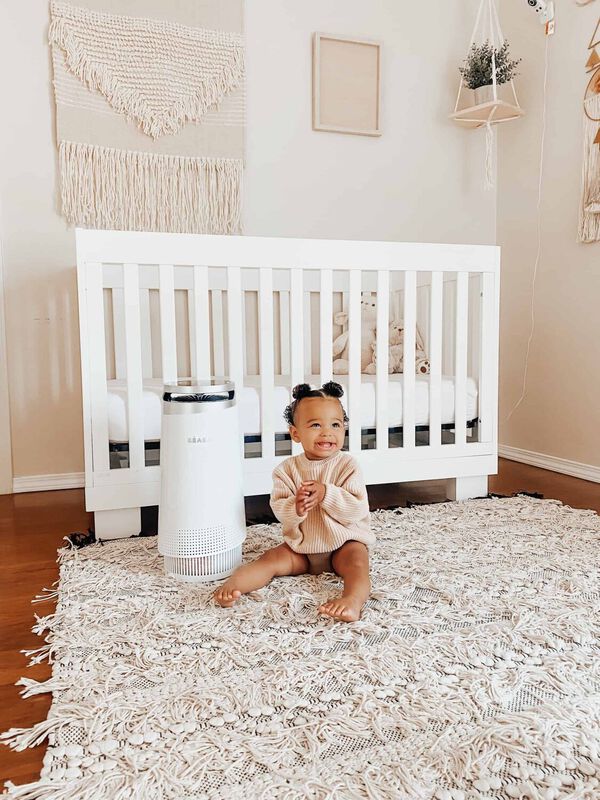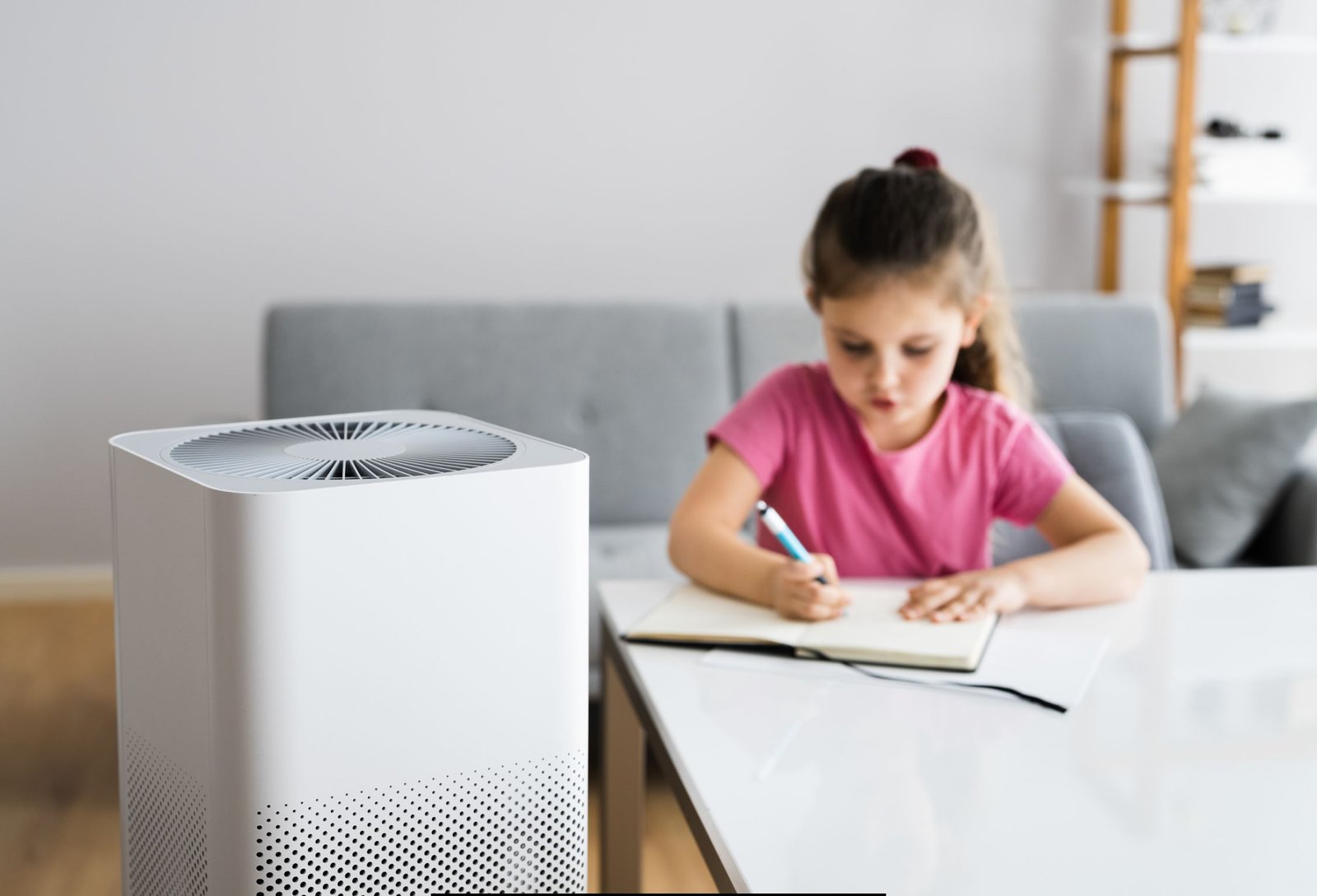Air purifiers can significantly reduce allergens in baby nurseries. They create a cleaner, healthier environment for your little one.
Babies are delicate and prone to allergies. Air purifiers help by removing dust, pollen, pet dander, and other particles from the air. This is crucial because a baby’s immune system is still developing. Clean air can prevent respiratory issues and allergic reactions.
Investing in a good air purifier can give peace of mind. It ensures that the air your baby breathes is free from harmful allergens. Creating a safe nursery is essential for your baby’s well-being and growth. In this post, we will explore how air purifiers work and their benefits. Let’s dive into the details to understand how they can make a difference.
Importance Of Air Purifiers In Nurseries
Ensuring a baby’s health is a priority for every parent. The air quality in a nursery can significantly impact a baby’s well-being. Babies are more sensitive to allergens and pollutants than adults. An air purifier helps remove these harmful particles. This creates a cleaner and safer environment for your child.
Protecting Infants From Allergens
Babies have fragile immune systems. They are more susceptible to allergens like dust, pollen, and pet dander. Exposure to these can cause allergies and respiratory issues.
Air purifiers come equipped with filters that trap these allergens. HEPA filters are especially effective. They capture particles as small as 0.3 microns. This reduces the risk of allergic reactions and keeps your baby healthier.
Creating A Safe Sleep Environment
A clean sleep environment is vital for a baby’s development. Air purifiers ensure the air your baby breathes is free from harmful particles. This contributes to better sleep quality.
Here are some benefits of using air purifiers in nurseries:
| Benefit | Description |
|---|---|
| Reduced Allergens | Filters out dust, pollen, and pet dander. |
| Cleaner Air | Removes pollutants and toxins. |
| Better Sleep | Provides a cleaner and quieter environment. |
| Less Sickness | Reduces the risk of respiratory problems. |
Consider using an air purifier with a HEPA filter. It’s highly effective in removing allergens. A quieter model is also beneficial. It ensures your baby sleeps undisturbed while breathing clean air.

Credit: airpurifiers.com
Common Allergens In Baby Nurseries
Baby nurseries should be a safe space for your little one. But allergens can make this space uncomfortable and unsafe. Understanding the common allergens in baby nurseries is key to maintaining a clean environment. Below, we discuss the most common allergens that could be affecting your baby’s nursery.
Dust Mites And Pollen
Dust mites thrive in warm, humid environments. They are common in bedding, carpets, and soft toys. These tiny creatures can cause allergic reactions and respiratory issues in babies. Pollen can also enter the nursery through open windows or on clothing. It can cause sneezing, runny noses, and itchy eyes.
Pet Dander And Mold Spores
Pet dander is another common allergen. It comes from the skin flakes, saliva, and urine of pets. Even if pets do not enter the nursery, their dander can still travel through the air. Mold spores can grow in damp areas. They are often found in bathrooms and basements, but can also be present in nurseries. Mold can cause respiratory issues and skin irritation in babies.
Types Of Air Purifiers
Choosing the right air purifier for a baby nursery can be a game changer. The right type can reduce allergens and improve air quality. Let’s explore two common types: HEPA filters and activated carbon filters.
Hepa Filters
HEPA stands for High-Efficiency Particulate Air. These filters trap tiny particles. They can capture dust, pollen, and pet dander. HEPA filters are effective for babies with allergies. They can remove particles as small as 0.3 microns.
HEPA filters are often used in hospitals. They are trusted by experts. Using them in a nursery can create a safer environment. Regularly changing the filter is important. This keeps the air clean and fresh for your baby.
Activated Carbon Filters
Activated carbon filters work differently. They remove odors and gases. These filters can absorb pollutants like smoke and chemicals. They are good for homes with smokers or pets.
Activated carbon filters have a unique structure. This allows them to trap gases and smells. They are excellent for babies sensitive to strong odors. Keeping the air pure helps babies sleep better and stay healthy.
Both HEPA and activated carbon filters offer unique benefits. Choosing the right one can make a big difference in your baby’s nursery.

Credit: www.beaba.com
How Air Purifiers Work
Air purifiers are essential for maintaining a healthy environment in baby nurseries. They help reduce allergens and ensure your baby breathes clean air. Understanding how these devices work is crucial for making an informed choice.
Capturing Airborne Particles
Air purifiers use filters to capture airborne particles. These particles include dust, pollen, and pet dander. A common type of filter is the HEPA filter. HEPA stands for High-Efficiency Particulate Air. It traps particles as small as 0.3 microns. This is effective at removing most allergens from the air.
Another type of filter is the pre-filter. Pre-filters capture larger particles like hair and dust. This protects the main filter and extends its life. The combination of these filters ensures cleaner air in the nursery.
Neutralizing Odors And Gases
Air purifiers also help neutralize odors and gases. Activated carbon filters are commonly used for this purpose. They absorb odors from diapers, pets, and cooking. These filters also capture harmful gases like smoke and volatile organic compounds (VOCs).
Some air purifiers use advanced technologies. For example, UV light can kill bacteria and viruses. This adds an extra layer of protection for your baby. Ensuring the air is not only clean but also safe.
Benefits For Babies
Air purifiers bring many benefits to baby nurseries. Clean air is vital for a baby’s health. Babies have delicate lungs that need protection. Air purifiers help create a safe environment. They remove harmful particles from the air. Let’s explore the specific benefits for babies.
Improved Respiratory Health
Babies breathe easier with clean air. Air purifiers remove dust, pollen, and pet dander. These particles can irritate a baby’s lungs. Clean air helps prevent respiratory issues. Healthy lungs support better growth and development. Parents can feel at ease knowing their baby breathes clean air.
Reduced Allergy Symptoms
Allergies can make babies uncomfortable. Air purifiers reduce allergens in the air. This helps lessen allergy symptoms like sneezing and itching. Babies sleep better and feel happier. A nursery with clean air promotes a peaceful environment. Parents notice fewer allergy-related problems. Air purifiers play a key role in allergy relief.
Choosing The Right Air Purifier
Ensuring the air in your baby’s nursery is clean is vital. An air purifier can help reduce allergens and improve air quality. But choosing the right air purifier is crucial. Here are some factors to consider:
Size And Coverage Area
Size and coverage area are important. You need an air purifier that fits well in the nursery and covers the entire room. A small purifier won’t clean the air effectively in a large room. Check the manufacturer’s specifications for coverage area. Compare this with the size of the nursery. Ensure the purifier can handle the square footage.
Noise Levels And Energy Efficiency
Noise levels and energy efficiency matter too. Babies need a quiet environment to sleep. An air purifier that makes a lot of noise is not ideal. Look for models with low decibel levels. Some purifiers have a quiet mode for nighttime use. Energy efficiency is also key. An efficient unit will save money on electricity bills. Look for Energy Star-rated models. These use less energy and are better for the environment.
Maintenance And Care
Maintenance and care are vital for ensuring the efficiency of air purifiers. They help to keep baby nurseries free of allergens. Proper upkeep not only extends the life of the device but also ensures clean air. This section covers essential tips for maintaining your air purifier.
Regular Filter Replacement
Filters are the heart of any air purifier. They trap dust, pollen, and other allergens. Over time, they become clogged and less effective. Replacing filters regularly is crucial. Check the manufacturer’s guidelines for the recommended replacement schedule. Some filters need replacing every few months. Others may last up to a year. Always use the correct type of filter for your model. This ensures optimal performance and air quality.
Cleaning And Upkeep Tips
Regular cleaning keeps your air purifier running smoothly. Dust and debris can accumulate on the exterior and interior parts. Wipe down the outside with a damp cloth weekly. Be sure to unplug the device first. For the interior, follow the user manual. Some parts may be dishwasher safe. Others require hand washing. Ensure all parts are dry before reassembling. Clean the sensors and vents to prevent blockages. This ensures the device detects and filters allergens efficiently.

Credit: www.amazon.com
Additional Tips For Allergen-free Nurseries
Air purifiers help keep baby nurseries allergen-free by removing dust, pollen, and pet dander. Cleaner air means fewer allergy triggers, ensuring a healthier environment for your baby.
Creating an allergen-free nursery for your baby goes beyond just using an air purifier. There are several other steps you can take to ensure the air is clean and safe. These additional tips will help you maintain a healthy and comfortable environment for your little one.Regular Cleaning Practices
Dust and allergens can accumulate quickly. Clean your baby’s nursery often. Use a damp cloth to wipe down surfaces. This prevents dust from becoming airborne. Vacuum the floor regularly, using a vacuum with a HEPA filter. This ensures that dust mites and other allergens are trapped effectively. Wash toys and other items frequently. This helps reduce the presence of allergens.Using Hypoallergenic Bedding
Choosing the right bedding is crucial. Opt for hypoallergenic materials. These materials are less likely to harbor dust mites. Wash bedding in hot water weekly. This kills dust mites and removes allergens. Use mattress and pillow covers that are allergen-proof. These covers act as a barrier against dust mites and other allergens. Ensure the crib mattress is firm and well-ventilated. This reduces the risk of mold growth. “`Frequently Asked Questions
How Do Air Purifiers Help In Baby Nurseries?
Air purifiers remove airborne allergens like dust, pollen, and pet dander. This helps in maintaining a cleaner and healthier environment in baby nurseries, reducing the chances of respiratory issues.
Can Air Purifiers Reduce Baby Allergy Symptoms?
Yes, air purifiers can reduce baby allergy symptoms. They filter out allergens and irritants, providing cleaner air for your baby to breathe, which helps in alleviating allergy symptoms.
What Types Of Allergens Do Air Purifiers Remove?
Air purifiers remove common allergens such as dust, pollen, mold spores, pet dander, and smoke particles. This makes the air in baby nurseries safer and cleaner.
Are Air Purifiers Safe For Baby Nurseries?
Yes, air purifiers are safe for baby nurseries. They effectively reduce airborne allergens and contaminants, ensuring your baby breathes clean and healthy air.
Conclusion
Air purifiers make baby nurseries safer by reducing allergens. Cleaner air means fewer sneezes and coughs. Babies breathe easier and sleep better. Parents worry less about allergies. Investing in a quality air purifier can improve your baby’s health. Keep the nursery free from dust, pollen, and pet dander.
Healthier breathing starts with cleaner air. Protect your baby’s health with an effective air purifier. A small step for peace of mind. A big step for your baby’s well-being.
Rakib Sarwar is a Registered Pharmacist and a reputed health and wellness blogger. He has a great interest in Air purifiers.
